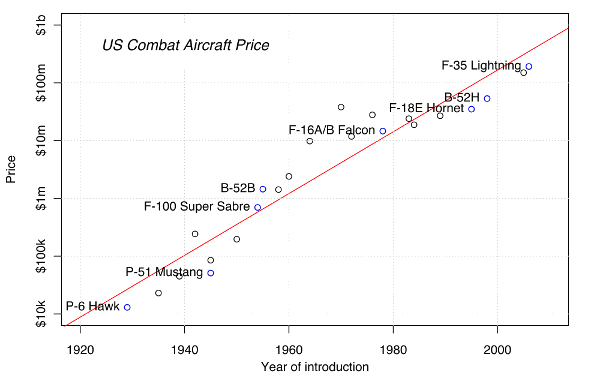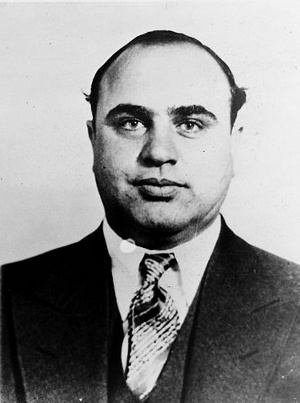Augustine Lays Down the Law
February 23, 2011
Engineers are not often published in
Forbes. However,
Norman Augustine, a Life Fellow of the
IEEE, is not your ordinary engineer. Augustine is a
Princeton University alumnus, he was
CEO of
Martin Marietta Corporation and its successor,
Lockheed Martin, and he was Chairman of the
National Academy of Engineering. Augustine also belies the image of the engineer planted in front of a computer screen, since he's visited both the
North and
South Pole.[1] My taking out the trash in last week's twenty degree
F weather hardly compares.
I've always enjoyed Augustine's writing.
Robert Lucky, formerly of
Bellcore/Telecordia, seems to write in the same style. Augustine is best known for his "Laws," published in 1986.[2] This is
Dilbert, written by an industry insider, who paints with words as well as
Scott Adams draws with pens. The book contains 52 laws (a
perfect number for a weekly desk calendar), although there was an earlier, 1983, book with fewer laws. Here are some highlights:
Law I - "The best way to make a silk purse from a sow's ear is to begin with a silk sow. The same is true of money."
Law XV - "The last 10 percent of performance generates one-third of the cost and two-thirds of the problems."
Law XXVI - "If a sufficient number of management layers are superimposed on top of each other, it can be assured that disaster is not left to chance."
Law XXXI - "The optimum committee has no members."
I don't know whether the present generation has heard about silk purses vs. sow's ears, but they likely do know the adage, attributed to
Titus Maccius Plautus, that it takes money to make money.
Augustine's laws had their start from his working in the
Pentagon, on and off, from 1965-1977, at one point as
Under Secretary of the Army, and then as Acting Secretary of the Army. He saw how defense systems were costing more and more, and he coined his first law, known as Law XVI in his book. From a
plot of the log of
combat aircraft acquisition price versus year, Augustine concluded that, since costs were growing exponentially, the entire US defense budget in the year 2054 would be spent on a single aircraft. Only an engineer would think of something like that.

Illustration of Augustine's Law XVI, that the unit cost of a new military aircraft grows exponentially in time. (Plot by "Autopilot" via Wikimedia Commons)
One interesting observation in the book is that when aircraft weight became an issue, and manufacturers couldn't justify putting more and more bells and whistles onto fighter jets,
software arose to add cost without adding weight.
Augustine's book isn't just an enumeration of laws. It's a commentary about the genesis of his laws, and includes such observations that proposals scale as one
millimeter in thickness for every million dollars asked; and that the work required for reporting and briefing is roughly one year per contract year; that is, only a small fraction of the funding actually goes towards "real" work - Something I've seen even when the research is an internal program not funded by the government. Although the statistics need to be updated to today, Augustine showed that there is no correlation between CEO pay and corporate performance, and that's coming from a man who was a CEO himself. Perhaps he thought he was an underpaid CEO.
Augustine's Forbes article[3] is on a familiar topic; namely, how to get children interesting in
science,
technology,
engineering and
mathematics (
STEM) professions, something I've written about in several previous articles.[4-6] The root problem, as Augustine points out in the introductory paragraphs, is that scientists and engineers are
geeks and misfits in the US, but they're
rock stars in other countries. It's rare for a US
politician to be anything other than a
lawyer, but in
China eight of the top nine political posts are held by engineers.[3] Seventy percent of engineers who've obtained a
Ph.D. degree in the US are foreign-born, and they're returning to their native countries to start companies that devastate our
balance of payments.
Although the US is lacking in competent science and math teachers, Augustine marks the irony that he can teach at Princeton, but he isn't qualified to teach
eighth grade mathematics. Although Augustine might not believe it, I think that teaching
tweens takes a little extra training; but, we both would agree that this training shouldn't be another four year college curriculum.
Most foreign countries are betting that the way to succeed in the world marketplace is by educating their children in the technical skills needed for
innovation. Some of these countries are now winning this bet. China is now the number one technology exporter, replacing the US. In 2009, more than half of US
patents were awarded to foreign companies. One interesting fact is that US consumers spend more on
potato chips than the US government spends on
energy research and development.[3]
In the last five years, six million US children have dropped out of
high school. Despite the potato chip statistic,[7] I don't think there are enough
fast food jobs to support these drop-outs. The US
standard of living is sinking, and there's nothing on the horizon that will stop that trend. Perhaps it's good we have a strong military, since we may need to go into the
extortion business.

No, he's not one of my relatives.
He's Al Capone.
With our abandonment of STEM, he's a potential role model to reduce our balance of payments)
![]()
References:
- Norman Augustine Biography, US Department of Energy, July, 2008.
- N. Augustine, "Augustine's Laws," sixth edition (AIAA, January 1, 1997), 395 pages, via Amazon
- Norman Augustine, "Danger: America Is Losing Its Edge In Innovation," Forbes Blog, January 20, 2011.
- Science Education, This Blog, January 27, 2011.
- K-12 Computer Education, This Blog, December 8, 2010
- Less Science in Pennsylvania, This Blog, June 18, 2010
- Or possibly, "potatoe," as one lawyer-politician prefers. Lest I gloat, I confess I would be lost without the spelling checker in the KWrite editor I use to compose these articles.
Permanent Link to this article
Linked Keywords: Engineer; Forbes; Norman Augustine; Institute of Electrical and Electronics Engineers; IEEE; Princeton University; CEO; Martin Marietta Corporation; Lockheed Martin; National Academy of Engineering; North Pole; South Pole; Fahrenheit; Robert Lucky; Bellcore; Telecordia; Dilbert; Scott Adams; perfect number; sow; Titus Maccius Plautus; Pentagon; Under Secretary of the Army; fighter aircraft; combat aircraft; software; millimeter; science; technology; engineering; mathematics; STEM; geek; rock star; politician; lawyer; China; Ph.D. degree; balance of payments; eighth grade; tween; innovation; patent; potato chip; energy; research and development; high school; fast food; standard of living; extortion; Al Capone.